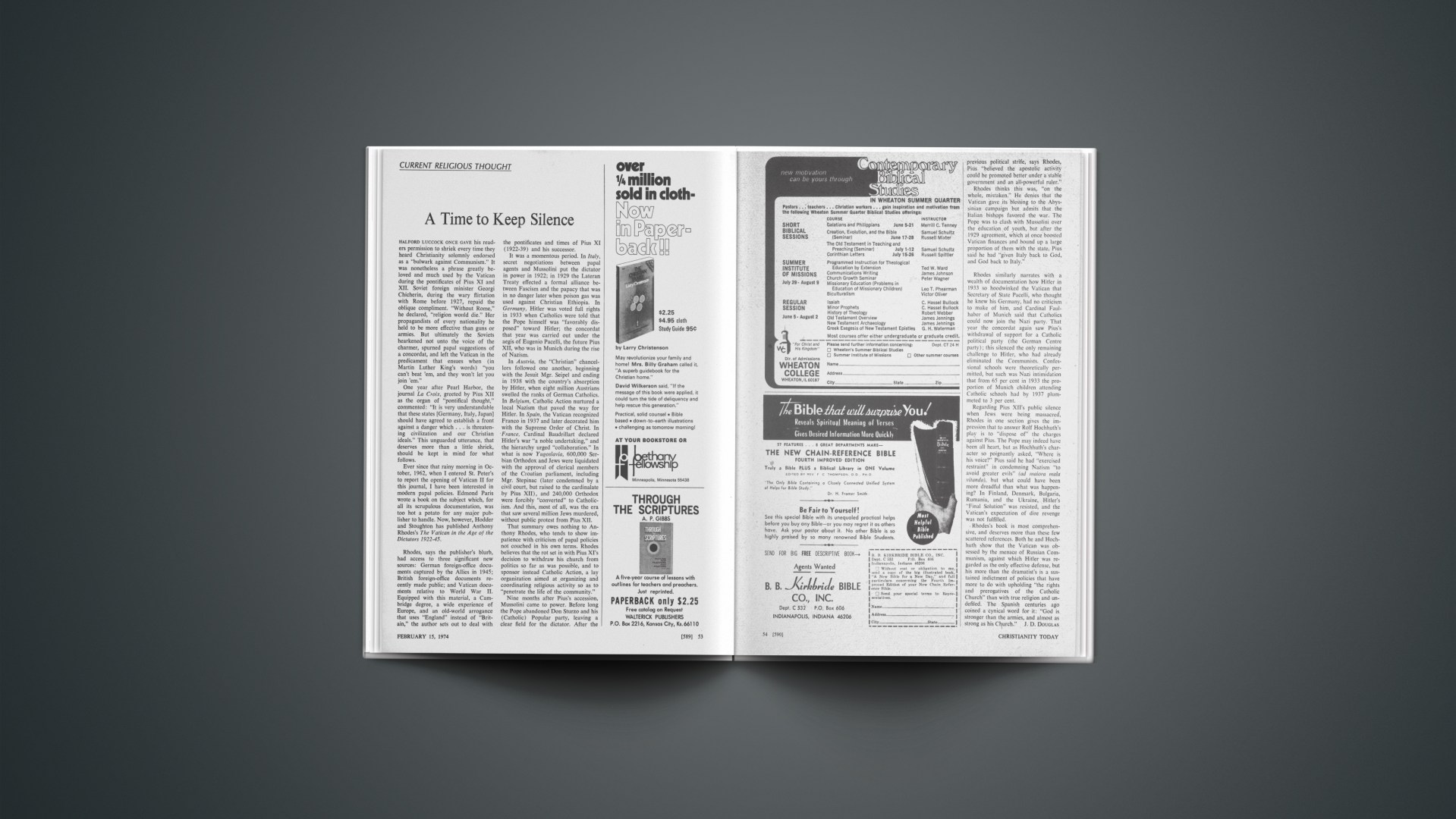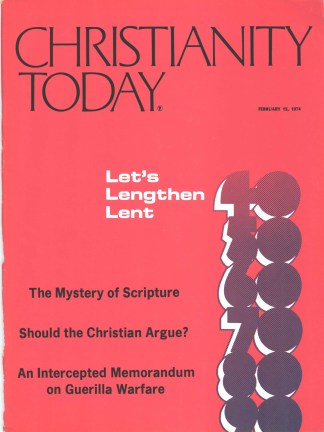Halford luccock once gave his readers permission to shriek every time they heard Christianity solemnly endorsed as a “bulwark against Communism.” It was nonetheless a phrase greatly beloved and much used by the Vatican during the pontificates of Pius XI and XII. Soviet foreign minister Georgi Chicherin, during the wary flirtation with Rome before 1927, repaid the oblique compliment. “Without Rome,” he declared, “religion would die.” Her propagandists of every nationality he held to be more effective than guns or armies. But ultimately the Soviets hearkened not unto the voice of the charmer, spurned papal suggestions of a concordat, and left the Vatican in the predicament that ensues when (in Martin Luther King’s words) “you can’t beat ’em, and they won’t let you join ’em.”
One year after Pearl Harbor, the journal La Croix, greeted by Pius XII as the organ of “pontifical thought,” commented: “It is very understandable that these states [Germany, Italy, Japan] should have agreed to establish a front against a danger which … is threatening civilization and our Christian ideals.” This unguarded utterance, that deserves more than a little shriek, should be kept in mind for what follows.
Ever since that rainy morning in October, 1962, when I entered St. Peter’s to report the opening of Vatican II for this journal, I have been interested in modern papal policies. Edmond Paris wrote a book on the subject which, for all its scrupulous documentation, was too hot a potato for any major publisher to handle. Now, however, Hodder and Stoughton has published Anthony Rhodes’s The Vatican in the Age of the Dictators 1922–45.
Rhodes, says the publisher’s blurb, had access to three significant new sources: German foreign-office documents captured by the Allies in 1945; British foreign-office documents recently made public; and Vatican documents relative to World War II. Equipped with this material, a Cambridge degree, a wide experience of Europe, and an old-world arrogance that uses “England” instead of “Britain,” the author sets out to deal with the pontificates and times of Pius XI (1922–39) and his successor.
It was a momentous period. In Italy, secret negotiations between papal agents and Mussolini put the dictator in power in 1922; in 1929 the Lateran Treaty effected a formal alliance between Fascism and the papacy that was in no danger later when poison gas was used against Christian Ethiopia. In Germany, Hitler was voted full rights in 1933 when Catholics were told that the Pope himself was “favorably disposed” toward Hitler; the concordat that year was carried out under the aegis of Eugenio Pacelli, the future Pius XII, who was in Munich during the rise of Nazism.
In Austria, the “Christian” chancellors followed one another, beginning with the Jesuit Mgr. Seipel and ending in 1938 with the country’s absorption by Hitler, when eight million Austrians swelled the ranks of German Catholics. In Belgium, Catholic Action nurtured a local Nazism that paved the way for Hitler. In Spain, the Vatican recognized Franco in 1937 and later decorated him with the Supreme Order of Christ. In France, Cardinal Baudrillart declared Hitler’s war “a noble undertaking,” and the hierarchy urged “collaboration.” In what is now Yugoslavia, 600,000 Serbian Orthodox and Jews were liquidated with the approval of clerical members of the Croatian parliament, including Mgr. Stepinac (later condemned by a civil court, but raised to the cardinalate by Pius XII), and 240,000 Orthodox were forcibly “converted” to Catholicism. And this, most of all, was the era that saw several million Jews murdered, without public protest from Pius XII.
That summary owes nothing to Anthony Rhodes, who tends to show impatience with criticism of papal policies not couched in his own terms. Rhodes believes that the rot set in with Pius XI’s decision to withdraw his church from politics so far as was possible, and to sponsor instead Catholic Action, a lay organization aimed at organizing and coordinating religious activity so as to “penetrate the life of the community.”
Nine months after Pius’s accession, Mussolini came to power. Before long the Pope abandoned Don Sturzo and his (Catholic) Popular party, leaving a clear field for the dictator. After the previous political strife, says Rhodes, Pius “believed the apostolic activity could be promoted better under a stable government and an all-powerful ruler.”
Rhodes thinks this was, “on the whole, mistaken.” He denies that the Vatican gave its blessing to the Abyssinian campaign but admits that the Italian bishops favored the war. The Pope was to clash with Mussolini over the education of youth, but after the 1929 agreement, which at once boosted Vatican finances and bound up a large proportion of them with the state, Pius said he had “given Italy back to God, and God back to Italy.”
Rhodes similarly narrates with a wealth of documentation how Hitler in 1933 so hoodwinked the Vatican that Secretary of State Pacelli, who thought he knew his Germany, had no criticism to make of him, and Cardinal Faulhaber of Munich said that Catholics could now join the Nazi party. That year the concordat again saw Pius’s withdrawal of support for a Catholic political party (the German Centre party); this silenced the only remaining challenge to Hitler, who had already eliminated the Communists. Confessional schools were theoretically permitted, but such was Nazi intimidation that from 65 per cent in 1933 the proportion of Munich children attending Catholic schools had by 1937 plummeted to 3 per cent.
Regarding Pius XII’s public silence when Jews were being massacred, Rhodes in one section gives the impression that to answer Rolf Hochhuth’s play is to “dispose of” the charges against Pius. The Pope may indeed have been all heart, but as Hochhuth’s character so poignantly asked, “Where is his voice?” Pius said he had “exercised restraint” in condemning Nazism “to avoid greater evils” (ad maiora mala vitanda), but what could have been more dreadful than what was happening? In Finland, Denmark, Bulgaria, Rumania, and the Ukraine, Hitler’s “Final Solution” was resisted, and the Vatican’s expectation of dire revenge was not fulfilled.
Rhodes’s book is most comprehensive, and deserves more than these few scattered references. Both he and Hochhuth show that the Vatican was obsessed by the menace of Russian Communism, against which Hitler was regarded as the only effective defense, but his more than the dramatist’s is a sustained indictment of policies that have more to do with upholding “the rights and prerogatives of the Catholic Church” than with true religion and undefiled. The Spanish centuries ago coined a cynical word for it: “God is stronger than the armies, and almost as strong as his Church.”










